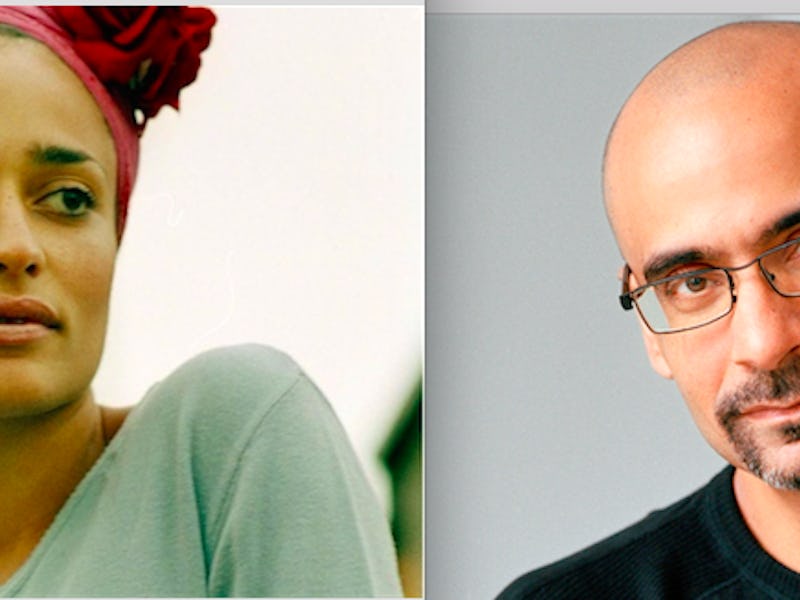Saturday Syllabi: Junot Diaz and Zadie Smith
Take a class without ever having to go to school.

Welcome to Saturday Syllabi, where we look at some of the essential texts that professors assign in the best courses from around the world. This is just like college, minus the deadlines, minus the bullshit look-at-me discussion-group hogs, minus the crushing loads of debt. Perfect, right? Right. Onward.
Up first, a couple of classes taught by literary heavyweights: Pulitzer Prize-winning Dominican-American writer Junot Diaz, and multi-award-winning London-born lit goddess Zadie Smith.
Diaz teaches at MIT’s Comparative Media Studies and Writing department, evidently for when computer programmers want to read something other than thousands of lines of Python. Smith most recently taught English at NYU, though the syllabus below comes from a course she taught at Columbia University in 2009.
Junot Diaz
Class: Undergraduate Fantasy World-Building
Prerequisites: “You will need to have seen Star Wars: Episode Four: A New Hope and read The Lord of the Rings by J.R.R. Tolkien.”
Course Description: “This class concerns the design and analysis of imaginary (or constructed) worlds for narrative media such as roleplaying games, films, comics, videogames and literary texts. … The class’ primary goal is to help participants create better imaginary worlds – ultimately all our efforts should serve that higher purpose.”
Reading List:
- A Princess of Mars by ER Burroughs
- Dracula by Bram Stoker
- Batman: The Dark Knight Returns by Frank Miller
- Sunshine by Robin McKinley
- V for Vendetta by Alan Moore
- The Hunger Games by Suzanne Collins
- The Hundred Thousand Kingdoms by NK Jemisin
- Lilith’s Brood by Octavia Butler
- Perdido Street Station by China Miéville
- Snow Crash by Neal Stephenson
Anybody who has read Diaz’ deeply personal but hyper-obsessive pop culture prose, with its many mentions of geek culture staples like Star Trek or Dune, knows that this dude knows exactly what he’s talking about. Doubtless, few authors have thought about how to create lived-in worlds from so many varied angles.
The selection of books here runs the gamut between genre classics and new notables, and it doesn’t discriminate. There are thousand-page fantasy tomes, graphic novels, first entries in YA series, and seriously hard sci-fi. But they all truly are tied to the theme of the class and allow students an opportunity to engage with the ways really good sci-fi can transport readers within a few paragraphs or panels. Any course that has you watch Star Wars and read The Lord of the Rings before the class even begins is a keeper.
Zadie Smith
Class: “Sense and Sensibility” - Weekly Seminar on Writing
Reading List:
- Brief Interviews with Hideous Men by David Foster Wallace
- Catholics by Brian Moore
- The Complete Stories by Franz Kafka
- Crash by J.G. Ballard
- An Experiment in Love by Hilary Mantel
- Modern Criticism and Theory: A Reader by David Lodge
- The Screwtape Letters by C.S. Lewis
- My Loose Thread by Dennis Cooper
- The Prime of Miss Jean Brodie by Muriel Spark
- The Loser by Thomas Bernhard
- The Book of Daniel by E.L. Doctorow
- A Room with a View by E.M. Forster
- Reader’s Block by David Markson
- Pnin by Vladimir Nabokov
- The Quiet American by Graham Greene
This relatively spare syllabus was taken from the Morningside Heights bookstore called Book Culture that provides Columbia students their inevitably overpriced books, so it doesn’t feature a course description or any prerequisites we know of, but Smith’s selections themselves are still telling.
We don’t want to be a buzzkill to all the Zadie-acs out there, but this seems like a fairly standard list to any writing course — maybe even boring? You’ve got your standards like Kafka, Nabokov, and Lewis. The Mantel is a fine inclusion, and any David Foster Wallace book is an added plus for a more contemporary literary perspective, but there isn’t any title on a superficial level that would make our literary heart skip a beat. Still: If you want to catch up on a version of the modern canon, here’s your grocery list.
The key to the class is probably the British deep cuts like Catholics and The Prime of Miss Jean Brodie that Smith could illuminate. The real worth to this class would be being there and talking things out with Smith herself. That, alas, is where we have to leave you.